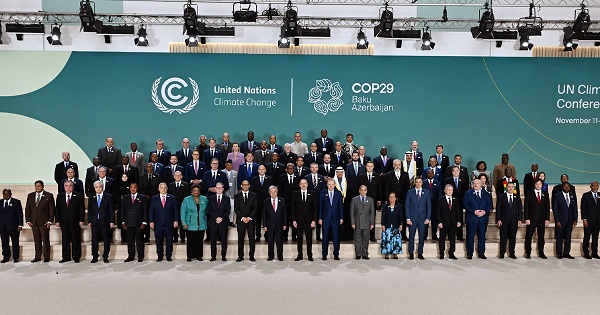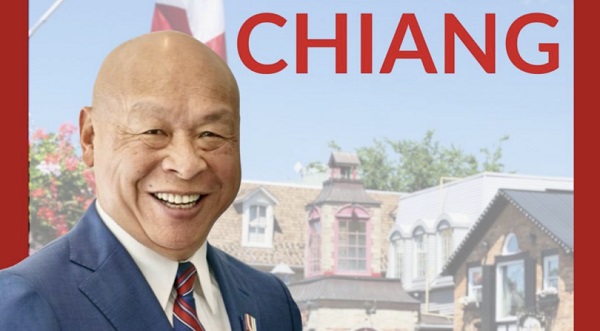Uncategorized
COP29 was a waste of time

From Canadians For Affordable Energy

The twenty-ninth edition of the U.N. Climate Change Committee’s annual “Conference of the Parties,” also known as COP29, wrapped up recently, and I must say, it seemed a much gloomier affair than the previous twenty-eight. It’s hard to imagine a more downcast gathering of elitists and activists. You almost felt sorry for them.
Oh, there was all the usual nutty Net-Zero-by-2050 proposals, which would make life harder and more expensive in developed countries, and be absolutely disastrous for developing countries, if they were even partially implemented. But a lot of the roughly 65,000 attendees seemed to realize they were just spewing hot air.
Why were they so down? It couldn’t be that they were feeling guilty about their own hypocrisy, since they had flown in, many aboard private jets, to the Middle Eastern petrostate of Azerbaijan, where fossil fuels count for two-thirds of national GDP and 90% of export revenues, to lecture the world on the evils of flying in planes and prospering from the extraction of oil and natural gas. Afterall, they did the same last year in Dubai and there was no noticeable pang of guilt there.
It’s likely that Donald Trump’s recent reelection had a lot to do with it. Living as they do in a media bubble, our governing class was completely blindsided by the American people’s decision to return their 45th president to the White House. And the fact that he won the popular vote this time made it harder to deny his legitimacy. (Note that they’ve never questioned the legitimacy of Justin Trudeau, even though his party has lost the popular vote in the past two federal elections. What’s the saying about the modern Left? “If they didn’t have double standards, they’d have no standards at all.”)
Come January, Trump is committed to (once again) pulling the U.S. out of the Paris Climate Accords, to rolling back the Biden Administration’s anti-fracking and pro-EV regulations, and to giving oil companies the green light to extract as much “liquid gold” (his phrase) as possible, with an eye towards making energy more affordable for American consumers and businesses alike. The chance that they’ll be able to leech billions in taxpayer dollars from the U.S. Treasury while he’s running the show is basically zero.
But it wasn’t just the return of Trump which has gotten the climate brigade down. After a few years on top, environmentalists have been having one setback after another. Green parties saw a huge drop off in support in the E.U. parliament’s elections this past June, losing one-third of their seats in Brussels.
And wherever they’ve actually been in government, in Germany and Ireland for instance, the Greens have dragged down the popularity of the coalitions they were part of. That’s largely because their policies have been like an arrow to the heart of those nations’ economies – see the former industrial titan Germany, where major companies like Volkswagen, Siemens, and the chemical giant BASF are frantically shifting production to China and the U.S. to escape high energy costs.
But while voters around the world are kicking climate ideologues to the curb, there are still a few places where they’re managing to cling to power for dear life.
Here in Canada, for instance, Justin Trudeau and Steven Guilbeault steadfastly refuse to consider revisiting their ruinous Net Zero policies, from their ever-increasing Carbon Tax, to their huge investments in Electric Vehicles and the mandates which will force all of us to buy pricey, unreliable EVs in just over a decade, and to the emissions caps which seek to strangle the natural resource sector on which our economy depends.
Minister Guilbeault was all-in on COP29, heading the Canadian delegation, which “hosted 65 events showcasing Canada’s leadership on climate action, nature-based solutions, sustainable finance, and Canadian clean technologies—while discussing gender equality, youth perspectives, and the critical role of Indigenous knowledge and climate leadership” and stood up for Canadian values such as “2SLGBTQI+” and “gender inclusivity.” Once again, in Azerbaijan, which has been denounced for its human rights abuses.
And no word yet on the cost of all of this – for last year’s COP28 the government – or should I say the taxpayers – spent $1.4M on travel and accommodations alone for the 633 member delegation. That number, not counting the above mentioned events, are sure to be higher, as Azerbaijan is much less of a travel destination than Dubai, and so has fewer flights in and available hotel rooms.
At the same time all of this was going on, Trudeau was 12,000 kms away in Rio de Janeiro, Brazil, telling an audience that carbon taxation is a “moral obligation” which is more important than the cost of living: “It’s really, really easy when you’re in a short-term survive, [to say] I gotta be able to pay the rent this month, I’ve gotta be able to buy groceries for my kids, to say, OK, let’s put climate change as a slightly lower priority.”
This is madness, and it underscores how tone-deaf the prime minister is, and also why current polling looks so good for the Conservatives that Pierre Poilievre might as well start measuring the drapes at the PMO.
He has the Trudeau Liberals’ obsessive pursuit of Net Zero policies in large part to thank for that.
The world is waking up to the true cost of the Net Zero ideology, and leaving it behind. That doesn’t mean the fight is over – the activists and their allies in government are going to squeeze as many tax dollars out of this as they possibly can. But the writing is on the wall, and their window is rapidly closing.
Dan McTeague is President of Canadians for Affordable Energy.
Uncategorized
Poilievre on 2025 Election Interference – Carney sill hasn’t fired Liberal MP in Chinese election interference scandal

From Conservative Party Communications
“Yes. He must be disqualified. I find it incredible that Mark Carney would allow someone to run for his party that called for a Canadian citizen to be handed over to a foreign government on a bounty, a foreign government that would almost certainly execute that Canadian citizen.
“Think about that for a second. We have a Liberal MP saying that a Canadian citizen should be handed over to a foreign dictatorship to get a bounty so that that citizen could be murdered. And Mark Carney says he should stay on as a candidate. What does that say about whether Mark Carney would protect Canadians?
“Mark Carney is deeply conflicted. Just in November, he went to Beijing and secured a quarter-billion-dollar loan for his company from a state-owned Chinese bank. He’s deeply compromised, and he will never stand up for Canada against any foreign regime. It is another reason why Mr. Carney must show us all his assets, all the money he owes, all the money that his companies owe to foreign hostile regimes. And this story might not be entirely the story of the bounty, and a Liberal MP calling for a Canadian to be handed over for execution to a foreign government might not be something that the everyday Canadian can relate to because it’s so outrageous. But I ask you this, if Mark Carney would allow his Liberal MP to make a comment like this, when would he ever protect Canada or Canadians against foreign hostility?
“He has never put Canada first, and that’s why we cannot have a fourth Liberal term. After the Lost Liberal Decade, our country is a playground for foreign interference. Our economy is weaker than ever before. Our people more divided. We need a change to put Canada first with a new government that will stand up for the security and economy of our citizens and take back control of our destiny. Let’s bring it home.”
Uncategorized
Canada Needs A Real Plan To Compete Globally

From the Frontier Centre for Public Policy
Ottawa’s ideological policies have left Canada vulnerable. Strategic action is needed now
As Canada navigates an increasingly complex geopolitical landscape, the next federal government must move beyond reflexive anti—Americanism regardless of its political leanings. Instead, Canada should prioritize national interests while avoiding unnecessary conflict and subservience.
The notion that Canada can stand alone is as misguided as the idea that it is only an economic appendage of the United States. Both perspectives have influenced policy in Ottawa at different times, leading to mistakes.
Rather than engaging in futile name-calling or trade disputes, Canada must take strategic steps to reinforce its autonomy. This approach requires a pragmatic view rooted in Realpolitik—recognizing global realities, mitigating risks, governing for the whole country, and seizing opportunities while abandoning failed ideologies.
However, if Washington continues to pursue protectionist measures, Canada must find effective ways to counteract the weakened position Ottawa has placed the country in over the past decade.
One key strategy is diversifying trade relationships, notably by expanding economic ties with emerging markets such as India and Southeast Asia. This will require repairing Canada’s strained relationship with India and regaining political respect in China.
Unlike past Liberal trade missions, which often prioritized ideological talking points over substance, Canada must negotiate deals that protect domestic industries rather than turning summits into platforms for moral posturing.
A more effective approach would be strengthening partnerships with countries that value Canadian resources instead of vilifying them under misguided environmental policies. Expand LNG exports to Europe and Asia and leverage Canada’s critical minerals sector to establish reciprocal supply chains with non-Western economies, reducing economic reliance on the U.S.
Decades of complacency have left Canada vulnerable to American influence over its resource sector. Foreign-funded environmental groups have weakened domestic energy production, handing U.S. industries a strategic advantage. Ottawa must counter this by ensuring Canadian energy is developed at home rather than allowing suppressed domestic production to benefit foreign competitors.
Likewise, a robust industrial policy—prioritizing mining, manufacturing, and agricultural resilience—could reduce dependence on U.S. and Chinese imports. This does not mean adopting European-style subsidies but rather eliminating excessive regulations that make Canadian businesses uncompetitive, including costly domestic carbon tariffs.
Another key vulnerability is Canada’s growing military dependence on the U.S. through NORAD and NATO. While alliances are essential, decades of underfunding and neglect have turned the Canadian Armed Forces into little more than a symbolic force. Canada must learn self-reliance and commit to serious investment in defence.
Increasing defence spending—not to meet NATO targets but to build deterrence—is essential. Ottawa must reform its outdated procurement processes and develop a domestic defence manufacturing base, reducing reliance on foreign arms deals.
Canada’s vast Arctic is also at risk. Without continued investment in northern sovereignty, Ottawa may find itself locked out of its own backyard by more assertive global powers.
For too long, Canada has relied on an economic model that prioritizes federal redistribution over wealth creation and productivity. A competitive tax regime—one that attracts investment instead of punishing success—is essential.
A capital gains tax hike might satisfy activists in Toronto, but it does little to attract investments and encourage economic growth. Likewise, Ottawa must abandon ideological green policies that threaten agri-food production, whether by overregulating farmers or ranchers. At the same time, it must address inefficiencies in supply management once and for all. Canada must be able to feed a growing world without unnecessary bureaucratic obstacles.
Ottawa must also create an environment where businesses can innovate and grow without excessive regulatory burdens. This includes eliminating interprovincial trade barriers that stifle commerce.
Similarly, Canada’s tech sector, long hindered by predatory regulations, should be freed from excessive government interference. Instead of suffocating innovation with compliance mandates, Ottawa should focus on deregulation while implementing stronger security measures for foreign tech firms operating in Canada.
Perhaps Ottawa’s greatest mistake is its knee-jerk reactions to American policies, made without a coherent long-term strategy. Performative trade disputes with Washington and symbolic grandstanding in multilateral organizations do little to advance Canada’s interests.
Instead of reacting emotionally, Canada must take proactive steps to secure its economic, resource, and defence future. That is the role of a responsible government.
History’s best strategists understood that one should never fight an opponent’s war but instead dictate the terms of engagement. Canada’s future does not depend on reacting to Washington’s policies—these are calculated strategies, not whims. Instead, Canada’s success will be determined by its ability to act in the interests of citizens in all regions of the country, and seeing the world as it is rather than how ideological narratives wish it to be.
Marco Navarro-Génie is the vice president of research at the Frontier Centre for Public Policy. With Barry Cooper, he is co-author of Canada’s COVID: The Story of a Pandemic Moral Panic (2023).
-

 2025 Federal Election2 days ago
2025 Federal Election2 days agoWEF video shows Mark Carney pushing financial ‘revolution’ based on ‘net zero’ goals
-

 2025 Federal Election2 days ago
2025 Federal Election2 days agoThree cheers for Poilievre’s alcohol tax cut
-

 2025 Federal Election2 days ago
2025 Federal Election2 days agoMORE OF THE SAME: Mark Carney Admits He Will Not Repeal the Liberal’s Bill C-69 – The ‘No Pipelines’ Bill
-

 2025 Federal Election2 days ago
2025 Federal Election2 days ago‘Coordinated and Alarming’: Allegations of Chinese Voter Suppression in 2021 Race That Flipped Toronto Riding to Liberals and Paul Chiang
-

 Break The Needle2 days ago
Break The Needle2 days agoWhy psychedelic therapy is stuck in the waiting room
-

 2025 Federal Election2 days ago
2025 Federal Election2 days agoDon’t let the Liberals fool you on electric cars
-

 2025 Federal Election2 days ago
2025 Federal Election2 days agoLiberal MP resigns after promoting Chinese government bounty on Conservative rival
-

 2025 Federal Election2 days ago
2025 Federal Election2 days ago‘I’m Cautiously Optimistic’: Doug Ford Strongly Recommends Canada ‘Not To Retaliate’ Against Trump’s Tariffs








